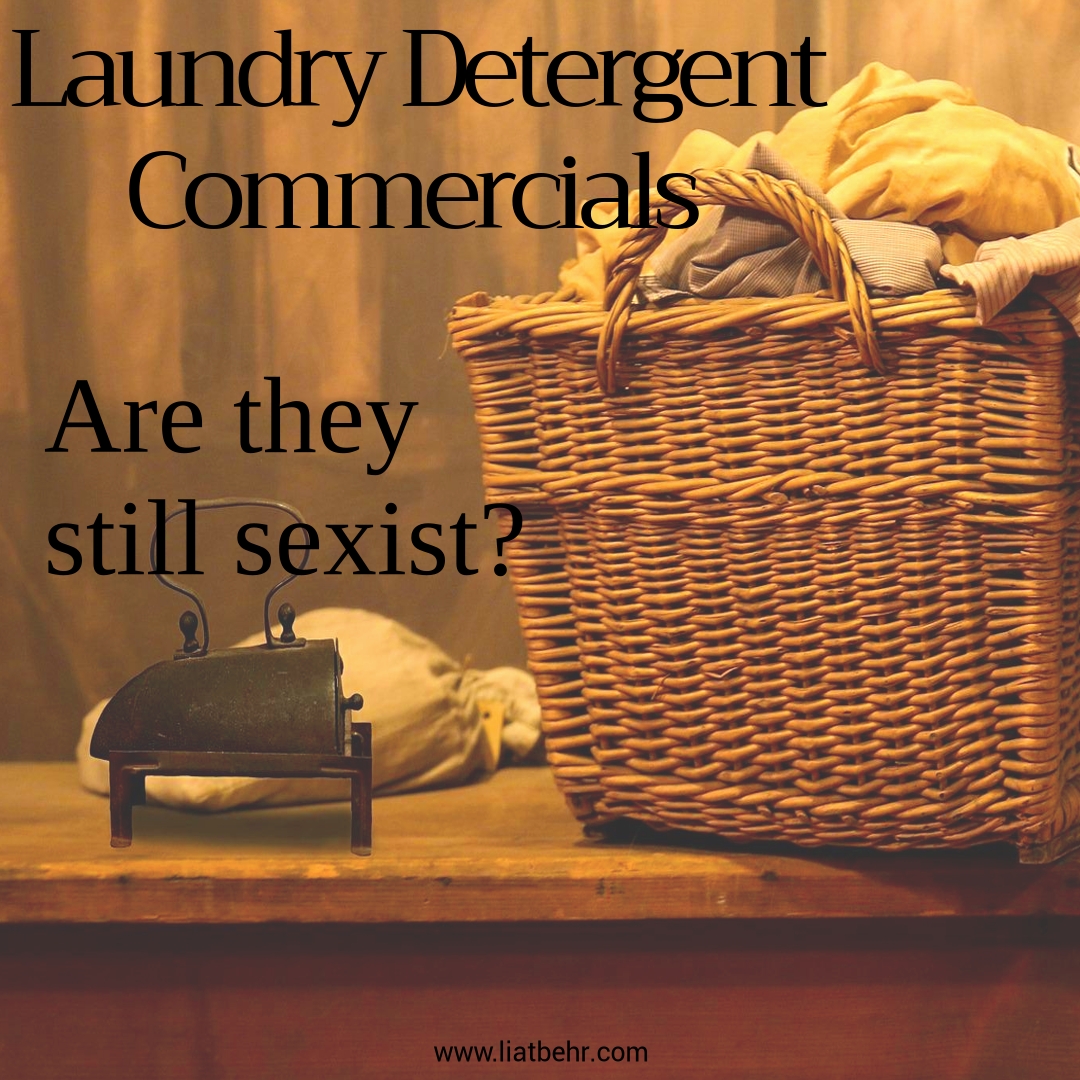While working on copy for laundry detergent and watching dozens of commercials, it recently occurred to me what a transformation laundry detergent commercials have undergone. In the likeable housewives era of the 1950s, women were portrayed as subservient and obedient. Today, while commercials aren’t necessarily set in the laundry room, the question is, are laundry detergent commercials still sexist, just in a different way?
The above 1950s commercial is completely unsurprising in terms of the gender stereotypes of the time. In this commercial, a boy makes a mess, as is expected of a boy; his perfectly dressed mother cleans up after him, doing his laundry, ironing and folding, as she is expected to; the voiceover – the voice of a man, is telling her (and us) what products she (and we) need to use to clean out the tough stains boys make.
By the 1970s things begin looking up a bit, at least in this commercial. Here the husband is doing laundry and his wife has faith in his laundering abilities. Only his mother-in-law is so old-fashioned to think him incapable of effectively knowing how to remove stains. And so the mother and daughter go shopping (another stereotype?), leaving the husband at home to take care of the laundry. And when they come home, it’s surprisingly stain free.
By 2018, there’s no woman, no laundry room and no laundry. Just the pure entertainment of watching almost familiar commercials and the hilarious interruption where we’re told it’s Tide ad. In some ads come the wild and genius assertion that all ads with clean clothes are in fact Tide ads.
But alas, all these ads were born in America.
In Israel, it’s 2018. And so I hoped to find a commercial with men doing laundry. But I didn’t.
What I did find was a commercial launched for Family Day, 2015. And then its follow-up commercial.
And I was disappointed.
Because the commercial starts off by claiming that men are full partners. And then it goes on to mention a research study, which claims that most women still don’t trust their husbands to do laundry. The question arises, can men be full partners in household work if they don’t do laundry? I imagine the answer will vary and that it depends on who you ask.
But for me this commercial was disappointing. Because essentially it blames women for their husbands not doing laundry. And that maybe so.
But if that’s what the research said, couldn’t you put a man in the laundry room doing laundry, to make women feel like they should be trusting their husbands to do laundry?
Let’s be clear. There’s no doubt that the commercial is in fact geared towards women. And there’s also no doubt that the intentions of the creatives behind the commercial and whoever approved it were pure – to promote sales and encourage wives to trust their husbands to do laundry.
But you don’t exactly encourage women to trust their husbands by portraying a husband spilling coffee on clean laundry.
In my mind, Ariel got this one wrong. They certainly didn’t convince me to buy their product. In fact, they totally missed the mark.
If I had to base my opinion of laundry detergent commercials being sexist on this one Ariel commercial, I would say, yup, laundry detergent commercials are still sexist just in a different way.
But perhaps I just couldn’t find the more recent commercials that paint a very different picture.
What do you think? Are laundry detergent commercials still sexist? Post your comments – and links to commercials below.




You know what? I don’t care any more about it. Maspik. Enough. Just get the dclothes clean–man or woman. And HERstory? Oh, please. I used to be a feminist back when it was new, but it has morphed into man-hatred, double standards, and leftist ideals contrary to their purpose. Where are they when it comes to women being damaged and “honorably” killed, say, in Muslim countries? So I’m tired of feminist political correctness. Many–yes many–women I know would rather be home raising their children rather than pawning them off to strangers and breaking their bodies over careers not a smidgin as important as raising a human being. I used to thing feminism was about choice. It iss not. The choice of making a home and raising children is anathema to feminism. By the way: the man who doesn’t do work in the house is, in my opinion, selfish lacking something in fairness and responsibility. (My husband is not thusly lacking.)
How about a concern for truth instead of today’s warped feminism focusing on TV ads?
Thank you for your comment, Andrea.
I can’t say that I share the same outlook. I believe that women’s stories do matter and that they have the profound ability to positively impact women’s lives.
Feminism means many things to many women. Like most ideas, it is not perfect.
But feminism is about improving women’s lives. It is certainly about giving them more choice.
Feminism is the understanding that women are intelligent human beings capable of making choices that right for them; each woman gets to choose what that means for her.
For me, understanding what feminism is and how it manifests itself in various media is both interesting and important.
This makes it a worthwhile endeavour.
Thank you again for your comment.